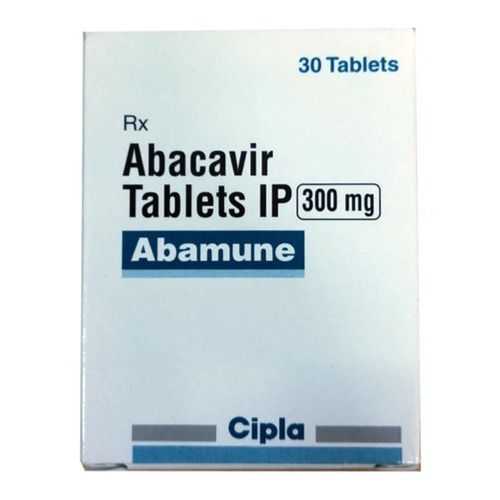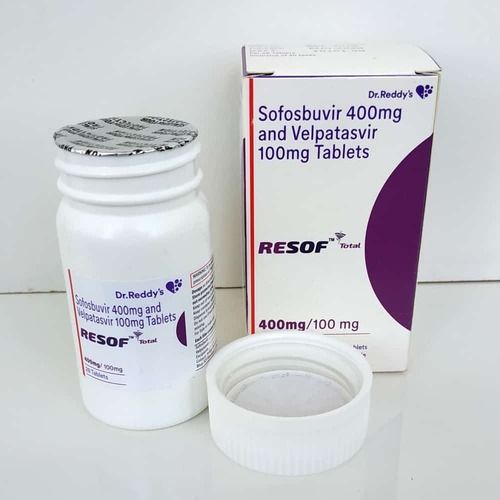Price 1240 INR/ Thousand
MOQ : 5 Bottles
Specification
- ಸೂಚನೆ
- Human Immunodeficiency Virus (HIV-1) infection
- ಪ್ಯಾಕೇಜಿಂಗ್ (ಪ್ರತಿ ಪೆಟ್ಟಿಗೆಗೆ ಪ್ರಮಾಣ)
- 1 bottle of 30 tablets
- ಡೋಸೇಜ್ ಫಾರ್ಮ್
- Tablet
- ಉಪ್ಪು ಸಂಯೋಜನೆ
- Abacavir Sulphate
- ಔಷಧದ ಮೂಲ
- Allopathic
- ಡ್ರಗ್ ವಿಧ
- ಪದಾರ್ಥಗಳು
- Abacavir Sulphate USP eq. to Abacavir 300mg
- ಶಾರೀರಿಕ ರೂಪ
- ಕಾರ್ಯ
- ಇದಕ್ಕಾಗಿ ಶಿಫಾರಸು ಮಾಡಲಾಗಿದೆ
- HIV-1 infection management in adults and children
- ಡೋಸೇಜ್
- As directed by the physician
- ಡೋಸೇಜ್ ಮಾರ್ಗಸೂಚಿಗಳು
- Take orally, as prescribed by healthcare provider
- ಸೂಕ್ತವಾಗಿದೆ
- ಪ್ರಮಾಣ
- 30 Tablets per bottle
- ಶೇಖರಣಾ ಸೂಚನೆಗಳು
- Store below 30°C. Protect from light and moisture
About
Abamune Tablet belongs to a group of medicines called antiretrovirals. It is used to treat HIV (human immunodeficiency virus), the virus that can cause AIDS (acquired immunodeficiency syndrome). It helps to control HIV infection so your immune system can work better.Abamune Tablet is not a cure for HIV or AIDS and only helps to decrease the amount of HIV in your body. This helps to lower your risk of getting HIV-related complications and improves your lifespan. It is prescribed in combination with other HIV medicines. Your doctor will recommend the best medicines for you and will decide the doses that you need. Follow carefully the instructions for all the medicines that you are given. It can be taken with or without food. Taking all these medicines regularly at the right times greatly increases their effectiveness and reduces the chances of HIV becoming resistant to them. It is important not to miss doses and to keep taking them until your doctor tells you it is safe to stop.Common side effects of this medicine include headache, nausea, vomiting, stomach pain, fatigue, diarrhea, and rash. These are usually not serious but tell your doctor if they bother you or do not go away. Rarely, some people may experience a skin reaction or liver damage. Your doctor will closely monitor you for these in the initial period of treatment.How ABAMUNE 300MG Works
ABAMUNE 300MG functions as a nucleoside reverse transcriptase inhibitor (NRTI) targeting the HIV-1 virus. By interfering with the viral replication process, it helps reduce the viral load in the patients body, supporting immune function.
Proper Usage and Dosage Guidelines
This medication should be taken orally, strictly following your physicians prescribed dosage. Both adults and pediatric patients can use ABAMUNE 300MG. Do not alter or discontinue the regimen without consulting your healthcare provider.
Safety and Storage Instructions
ABAMUNE 300MG should be stored below 30C, protected from light and moisture. Adherence to storage guidelines preserves the medicines efficacy and shelf life, which is 36 months. Keep it inaccessible to children and avoid using it after the expiry date.
FAQs of ABAMUNE 300MG:
Q: What is ABAMUNE 300MG used for?
A: ABAMUNE 300MG is primarily indicated for the management of HIV-1 infection in adults and pediatric patients as part of combination antiretroviral therapy.Q: How should I take ABAMUNE 300MG?
A: Take ABAMUNE 300MG orally as directed by your healthcare provider, usually once or twice daily. Be sure to follow the precise dosage and schedule prescribed to you.Q: Who should not use ABAMUNE 300MG?
A: Patients who have the HLA-B*5701 allele must not use ABAMUNE 300MG, as they are at high risk of developing severe hypersensitivity reactions to abacavir.Q: What are common side effects of ABAMUNE 300MG?
A: Possible side effects include nausea, headache, and hypersensitivity reactions. If you experience any severe or unusual symptoms, seek medical attention promptly.Q: Where should I store ABAMUNE 300MG?
A: Store ABAMUNE 300MG below 30C, protected from light and moisture, in its original container, and keep it out of reach of children.Q: What should I do if I miss a dose?
A: If you miss a dose, take it as soon as you remember unless its almost time for your next dose. Do not double up doses to compensate for the missed one. Consult your physician if unsure.Q: What benefits does ABAMUNE 300MG provide?
A: By reducing the amount of HIV in the body, ABAMUNE 300MG supports a healthier immune system, lowers the risk of HIV-related complications, and helps prevent transmission when used as part of antiretroviral therapy.
Tell us about your requirement

Price: Â
Quantity
Select Unit
- 50
- 100
- 200
- 250
- 500
- 1000+
Additional detail
ಮೊಬೈಲ್ number
Email
ಇನ್ನಷ್ಟು Products in ಔಷಧೀಯ ಮಾತ್ರೆಗಳು Category
ಸೂರ್ಯ ಸ್ಪೆಷಾಲಿಟಿ ಫಾರ್ಮಾ
GST : 29AXZPT5360J1ZC
GST : 29AXZPT5360J1ZC
Bno No - 33, ನೆಲ ಮಹಡಿ, 14ನೇ ಮುಖ್ಯ ಕುಮಾರಸ್ವಾಮಿ ಲೇಔಟ್, 1 ಸ್ಟ ಹಂತ,ಬೆಂಗಳೂರು - 560078, ಕರ್ನಾಟಕ, ಭಾರತ
ದೂರವಾಣಿ :08045804285
|
 |
SURYA SPECIALITY PHARMA
ಎಲ್ಲ ಹಕ್ಕುಗಳನ್ನು ಕಾಯ್ದಿರಿಸಲಾಗಿದೆ.(ಬಳಕೆಯ ನಿಯಮಗಳು) ಇನ್ಫೋಕಾಮ್ ನೆಟ್ವರ್ಕ್ ಪ್ರೈವೇಟ್ ಲಿಮಿಟೆಡ್ . ಇವರಿಂದ ಅಭಿವೃದ್ಧಿಪಡಿಸಲಾಗಿದೆ ಮತ್ತು ನಿರ್ವಹಿಸಲಾಗಿದೆ |

 ವಿಚಾರಣೆಯನ್ನು ಕಳುಹಿಸಿ
ವಿಚಾರಣೆಯನ್ನು ಕಳುಹಿಸಿ





